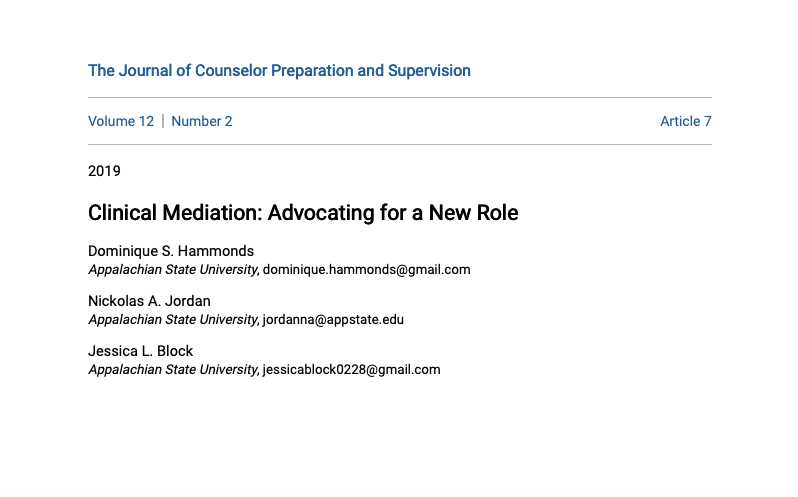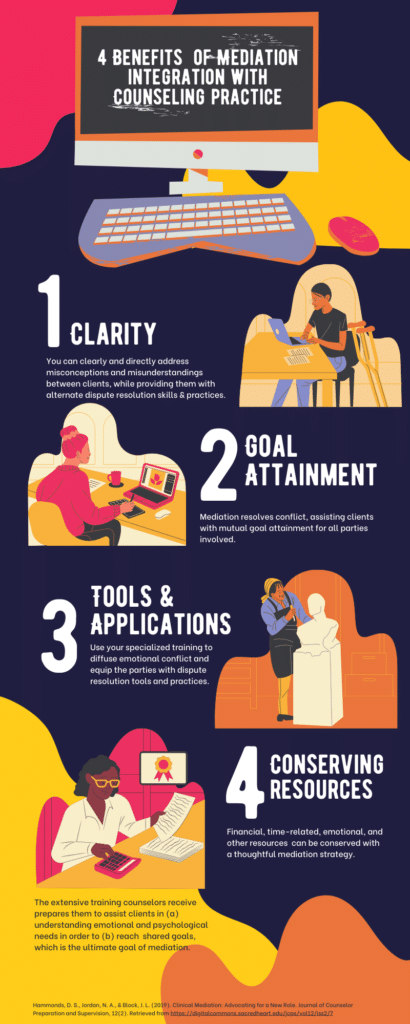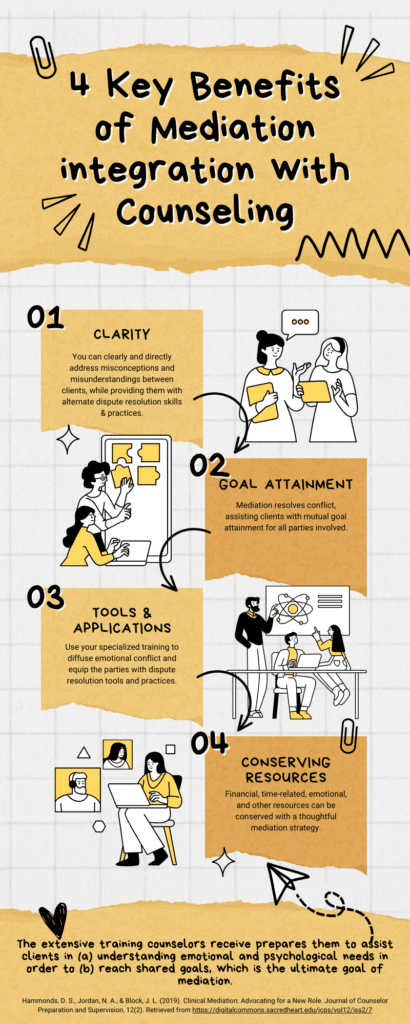Mediation – An Integral Part of Therapy
In her 2020 article about mediation in family and couples therapy, therapist Pamela Garber, LMHC, describes her journey as a therapist who integrated mediation into her private therapy practice after nearly 20 years. Garber argues that she found an “unquestionable link” between the philosophy of mediation and the therapeutic family systems approach to family and couples therapy. She articulates the similarities between the two: both require awareness of the other’s point of view, leading to a fair compromise. Through the use of empathy and communication, mediators and therapists alike assist clients move beyond an adversarial stance, seeking revenge and vindication, toward mutual understanding and progress toward shared goals.
Garber does not limit her application of mediation to joint therapy sessions, either. She contends that effective individual therapy mirrors many of the core tenets of mediation practice and philosophy, including understanding diverse points of view, “forward/future thinking,” and prioritizing moving forward through and beyond conflict. Whereas therapy may orient toward the past, mediation is often future-focused. Nevertheless, the three-pronged approach to therapy (1. dealing with psychological traumas and past experiences; 2. analytically and cognitively understanding the “why” of those past experiences; and 3. “identifying the advantages of moving forward, beyond resentment and free from preoccupation”). Garber suggests that mediation assists in the second and third prongs, but uses therapeutic work in the first prong as a foundation or platform upon which the latter two may be developed and explored.
Finally, Garber presents a case study of individual therapy in which she used therapeutic and mediation approaches to address conflict and compromise, even when the other party implicated in the individual client’s work was not present in the session. In short, using the therapeutic process to analyze mediation constructs like understanding another’s point of view, expressing empathy, and “bargaining” in a hypothetical sense can assist clients in processing past traumas as they engage in a sort of mediated process.
Balancing Roles: Psychologist Mediators and the Value of Counselor Training in Mediation
Ilene Diamond, clinical psychologist, attorney, and mediation consultant, makes a similar case for the value of psychological training and counseling practice in mediation. Importantly, though, Diamond clarifies the roles of a psychologist and mediator in the context of mediation: a clinical psychologist, therapist, or counselor engaged in mediation does not provide therapy, diagnosis or treatment in mediation. Rather, they draw on their training and education in the therapeutic process to assist parties in a mediation understand the nature and cause(s) of the conflict, orient toward the future and possible solutions, and work together to reach a mutually-beneficial outcome through mediation.
Training as a psychologist, counselor, and therapist also offers a refreshingly different perspective than many attorney-mediators and others without training in psychology and the social sciences. Training in psychology and counseling provides insight into emotional impacts, interior psychological “landscapes,” and how meaning is derived from experience. By using those perspectives and understanding in mediation, the therapist mediator can assist clients in their own self-awareness and understanding, acknowledgment of the other’s point of view, and goal-oriented movement toward consensus, agreement, and settlement.
In her article, Diamond discusses one reality of mediation services and Alternate Dispute Resolution in the United States: most mediators are attorneys or in some way affiliated with the legal profession, from practicing attorneys whose firms have a mediation program to retired judges who practice mediation in retirement. While knowledge of the legal system confers specific, valuable benefits to practitioners and clients alike, legal, attorney-based mediation may lack the therapist’s perspective and understanding of human emotion, trauma experiences, and the psychological underpinnings of behavior. Each of these, if properly understood, can assist mediation clients in assessing their own perspectives (and those of other parties), understanding motivations and interests, and ultimately moving toward resolution and a desired outcome.
Psychologist mediators are better prepared than non-therapists to handle the range of emotions expressed in mediation. They also bring knowledge of mental health that will likely impact negotiations and discussions, whether a client suffers from substance abuse disorder or has a borderline personality. It is not uncommon for non-therapist mediators to refer clients for therapy. While psychologist-mediators do not offer therapy in mediation, their specialized training can assist clients navigate the complexities of mediated disputes.
Diamond discusses the various mediation contexts where a therapist mediator most effectively practices. Family, divorce, harassment, employment discrimination, and specialized cases involving medical and psychiatric facilities or malpractice suits are just a few areas where the counselor, psychologist, or therapist’s expertise may be invaluable. In any mediation, the skills of empathy, validation, and respect are essential, and most mediators are trained to engage with clients using those practices. Yet psychologist mediators have a deeper awareness and training in dealing with loss, finding meaning and dignity in personal experiences, and “appropriately paced process[es]” for dealing with the emotional impact of disputes and conflict resolution.







